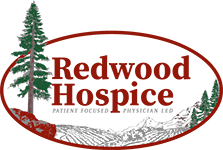California End of Life Option Act
Medical Aid in Dying:
- Redwood Hospice will facilitate discussions and information about MAID.
- Redwood Hospice physicians may serve as MAID Consulting and/or Prescribing physicians.
- Redwood Hospice clinicians will provide hospice care throughout the patient’s life. If requested by the patient, our clinical staff (nurse, social worker, chaplain, or physician) may be present in the patient’s home at the time when patient self-administers the MAID medications, but will not be present in the patient’s room. Our hospice requires that our staff leave the room at the time when the patient is self-administering (ingesting) the medical aid in dying medications. In other words, our staff may be present prior to and post ingestion of the aid-in-dying medication, but not during the self-administration of the medication.
- Patient must be able to self-administer the medical aid in dying medications. This means the patient can have no assistance from anyone in order to ingest those medications.
- Our hospice does not require staff to be involved with MAID processes or events. We allow our staff to determine whether they individually will participate in the MAID process.
- It is important for patients to understand that from the time of their request for MAID evaluation and medications, it may take from two days to some weeks to identify and address all individual needs of the patient for the aid-in-dying process, including required documentation and required evaluations to confirm eligibility and ability to participate in MAID.
Redwood Hospice supports a person’s right to rely on the California End of Life Option Act (EOLOA), also known as Medical Aid in Dying, or MAID.
For more information on the EOLOA, please refer to the California Department of Public Health’s webpage.
